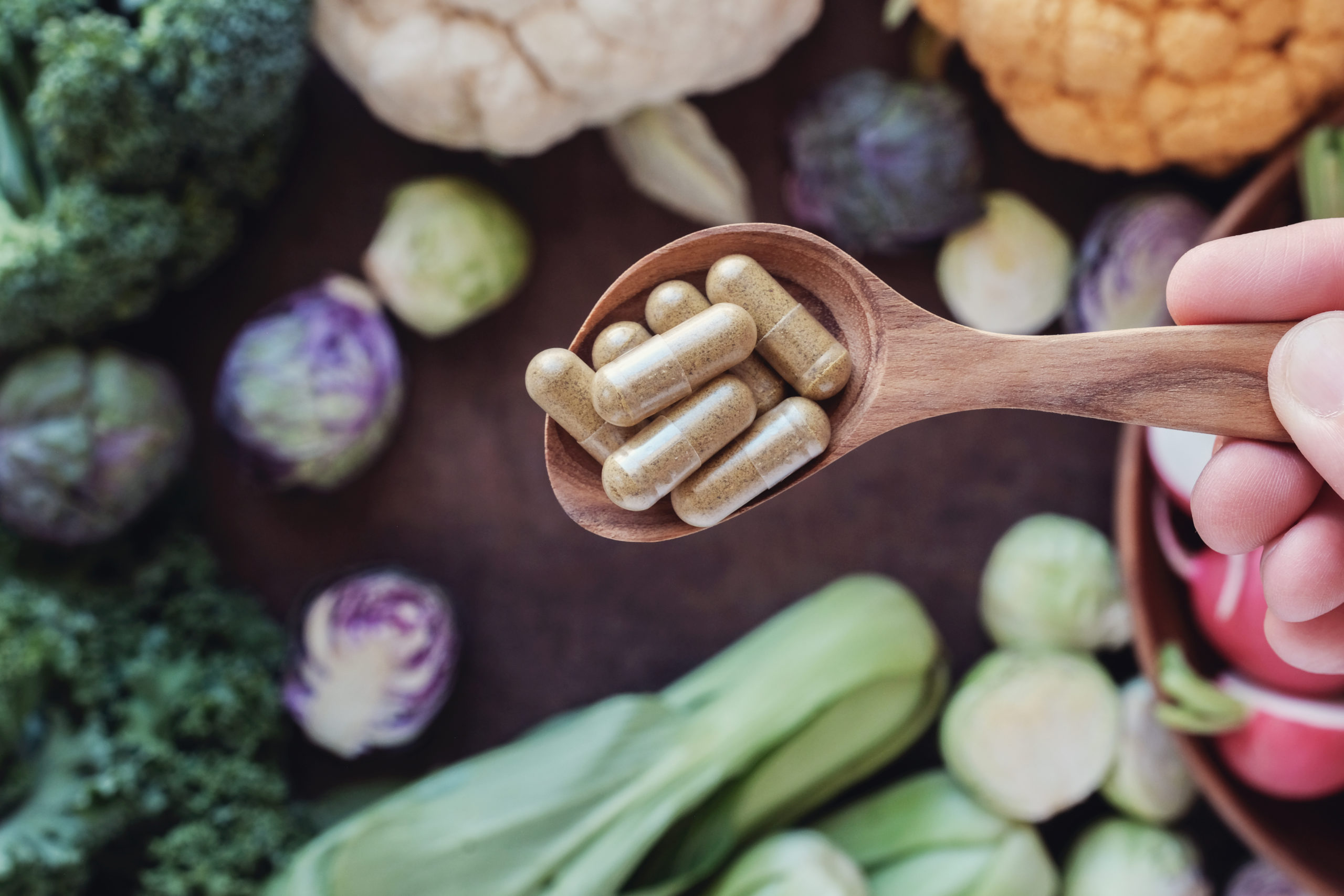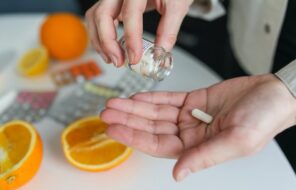If you do even a modicum of digging, you’ll find plenty of research to support the myriad benefits of plant-based diets. From reducing the risk of Type 2 diabetes to a lower risk of cardiovascular disease, it’s plant-based diets for the win. But if you look closely, the research also shows that an improperly balanced plant-based diet can lead to deficiencies in omega-3 fatty acids, iron, vitamin D and calcium, iodine, vitamin B12, and other nutrients.
The good news is you can avoid these deficiencies by balancing your diet and adding a few supplements to make up for wherever you’re falling short. Here’s a closer look at the best supplements to take if you’re on a vegan diet.
Vitamin B12
B12 is an essential micronutrient that plays a role in many biochemical processes in your body. Vitamin B12 is necessary for the formation of red blood cells, and it plays a key role in nervous system functioning and the biosynthesis of neurotransmitters. Common signs and symptoms of a B12 deficiency include fatigue, lack of energy, headache, irritability, possible anemia, depression, and sleep disorders.
Recommended daily intake: 14-plus-year-olds — 2.4 mcg | Common plant food sources: Bananas, kidney beans, strawberries, and spinach
Iron
Iron is an essential mineral that your body needs for growth and development. Specifically, iron is required to make hemoglobin and myoglobin — the protein in red blood cells that carries oxygen from your lungs to the rest of your body and the protein that provides oxygen to your muscles, respectively. If that’s not enough, your body needs iron to produce some hormones.
It’s worth noting that while plant-based diets may have the same amount of iron as standard diets, vegans run the risk of iron deficiency because the bioavailability of the mineral in plant foods is lower “due to the absence of heme iron.” So to that end, iron supplements may be needed in order to keep things running smoothly. Keep in mind, though, that while your body needs iron, it can be toxic in high doses.
Common signs and symptoms of iron deficiency include fatigue, pale skin, shortness of breath, headaches, cold hands and feet, and brittle nails
Recommended daily intake: Adult women 19 to 50 years old — 18 mg | Common plant food sources: Legumes (beans, lentils, peas, peanuts), leafy greens, soy, quinoa, potatoes, and dried fruit
Calcium
It’s pretty common knowledge that calcium plays an important role in bone health, but your muscles, nerves, and heart also need calcium to function properly. Beyond that, research also shows that calcium plays a role in blood pressure maintenance and may help keep cholesterol in check.
The way calcium functions in your body is also pretty interesting: If your diet doesn’t provide the calcium that your body needs, your bones will essentially pick up the slack and release calcium into your blood as needed — pretty cool, right?
Recommended daily intake: Adults 19 to 50 years old — 1,000 mg | Common plant food sources: Kale, broccoli, Chinese cabbage (bok choy), soy milk, tofu, almonds, and chia seeds
Vitamin D
Vitamin D is the only mineral your body can produce naturally, yet surprisingly, a jaw-dropping 41% of Americans are falling short of this essential micronutrient. It’s also worth noting that Vitamin D is actually a hormone and not a vitamin at all.
While Vitamin D’s main function is to support healthy bones and teeth, the hormone also plays a key role in regulating inflammation and your body’s immune function.
One of the more important things to know about vitamin D is that while your body can produce it, exposure to sunlight is necessary to do so efficiently, so if you’re not getting out and about regularly, your vitamin D levels may be inadequate. Moreover, the main sources of vitamin D are red meat, poultry, egg yolks, fish, and fish oil, so if you follow a vegan diet, you can see where supplementation may be necessary.
Recommended daily intake: Adults 19 to 50 years old — 600 international units | Common plant food sources: Mushrooms, soy, broccoli, and fortified cereal
Omega-3 fatty acids
While fat always gets a bad rap, the fact is our bodies need a certain amount of fat to function properly. Not only do dietary fats play a key role in energy production, but they also support cell function. Plus, they protect our organs and keep our bodies warm. If that weren’t plenty, fat also plays a role in the absorption of nutrients and the production of some hormones.
And while our bodies can make some of the fat that it needs, omega-3 fatty acids are the exception. Ultimately, that means that omega-3 fats must come from our diet. But when fish and other kinds of seafood are the richest sources of omega-3 fatty acids, it’s easy to see how this could be problematic for those following a vegan diet.
Common signs and symptoms of omega-3 fatty acid deficiency include dry skin, fatigue, poor circulation, and depression.
Recommended daily intake: 500 mg (EPA plus DHA) | Common plant food sources: Nuts and seeds (e.g., chia seeds, flax seeds, walnuts) and plant oils (e.g., soybean oil, flaxseed oil, canola oil)
Iodine
Iodine is a trace mineral that our body uses to produce thyroid hormones that ultimately play a key role in protein synthesis, metabolism, and cell repair. Symptoms of iodine deficiency include hypothyroidism, goiter, and impaired mental functioning. It’s also worth noting that iodine deficiency during pregnancy can lead to low birth weight, congenital abnormalities, and stillbirth.
Recommended daily intake: Adults 19+ years old — 150 mcg (Note: For women, the RDA is higher for those who are pregnant or lactating) | Common plant food sources: Seaweed, bread, pasta
The key to a healthy vegan diet
The foods we eat are packed with the nutrients, vitamins, and minerals we need for optimal health — that includes animal sources. Unfortunately, eliminating entire food groups can lead to a host of issues from dry skin to depression. And while following a plant-based diet may require a little more work on your part, doing so in a healthy way is not impossible. Ultimately, the key to a healthy vegan diet is maintaining the right balance of nutrients and proper supplementation for the vitamins and minerals where you may come up short.





